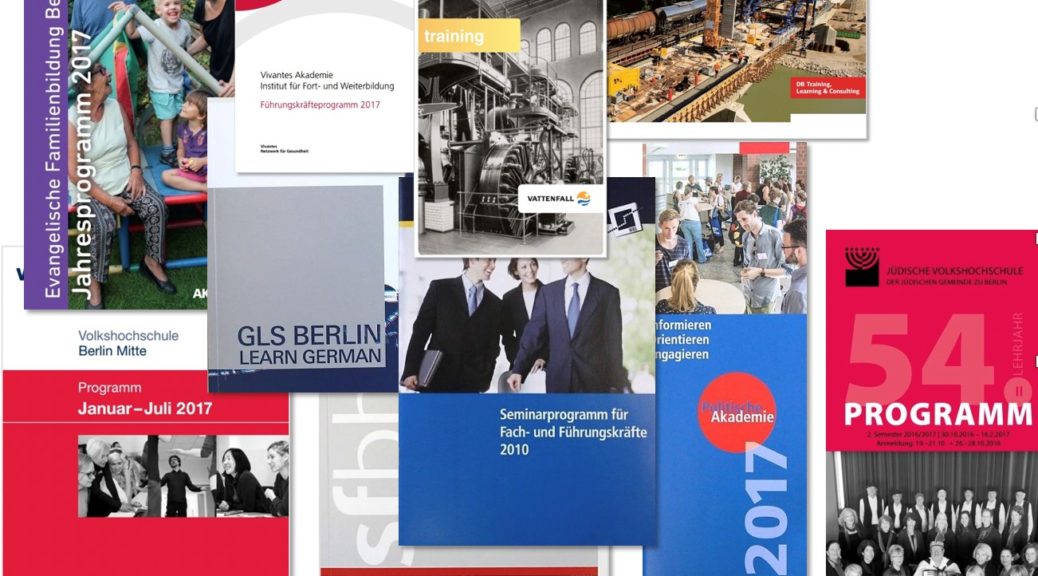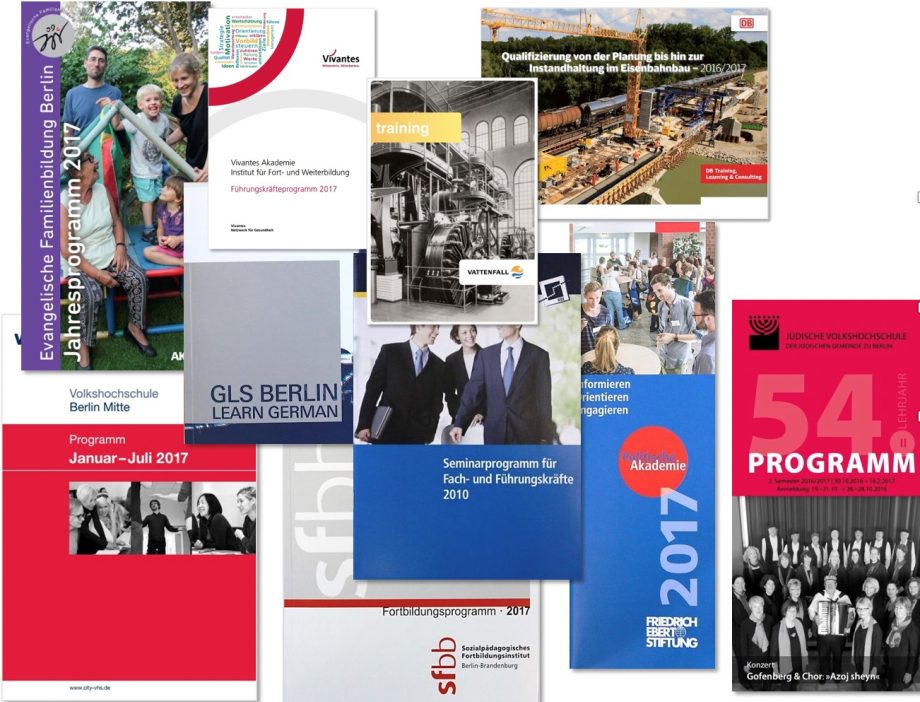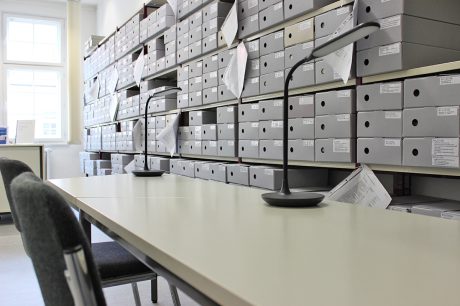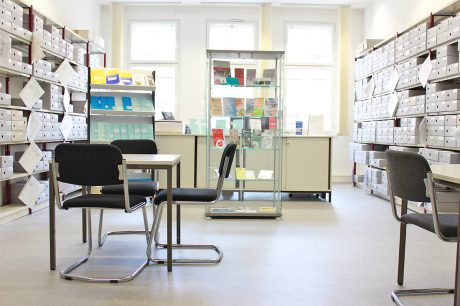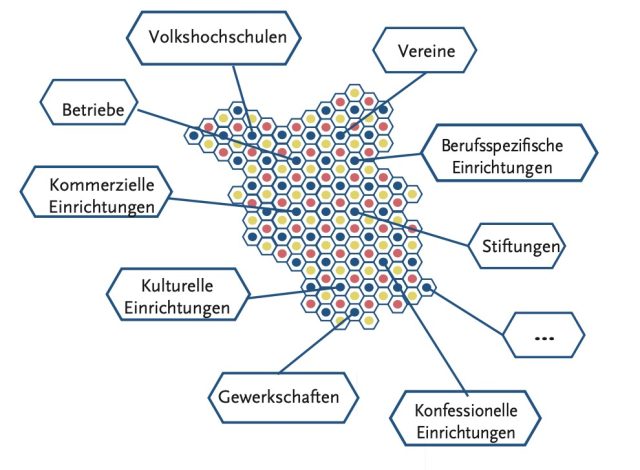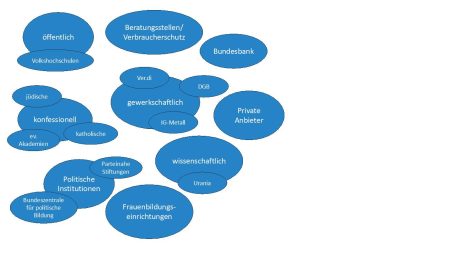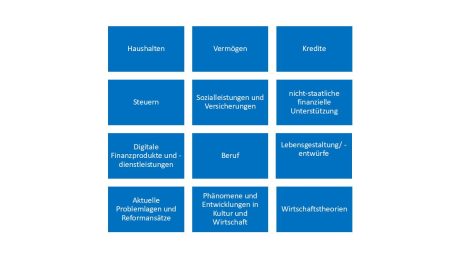Object of the Month 06/2024
What learning and educational opportunities are there for adults? What topics do different providers offer as courses, events, seminars and workshops, for example on sustainability, social cohesion, culture or the requirements of the world of work between professional relevance and key qualifications? And for which target groups do they offer them? How can statements be made about topics and target groups that are and have been relevant in adult and continuing education – and therefore in society – in the past and present?
These questions can be answered through the analysis of programs (and the announcements of offers therein), which are usually published either as booklets or flyers by continuing education providers. They contain descriptions of the planned educational offers, information on participation modalities and often forewords that allow conclusions to be drawn about the educational program orientation of the providers.
Program archives collect continuing education programs, which are generally not systematically collected by municipal archives, libraries or the providers themselves, and make them available as primary research data. In this way, they aid the identification of structural developments and also document changes in the continuing education landscape. These were the two main goals of the founding of the Weiterbildungsprogramm-Archiv Berlin/Brandenburg in 1995. Wiltrud Gieseke, who founded the collection and held the department chair at that time, wanted to map the developments taking place after German reunification, including the merging of two different social, labor market and continuing education systems. For this purpose, it was necessary to actively collect the programs of continuing education providers from the states of Berlin and Brandenburg retroactively from 1990.
Today, the Weiterbildungsprogramm-Archiv (Archive of Programs of Continuing Education) comprises a collection of around 18,000 programs from more than 1,100 continuing education institutions and other providers of continuing education. The archive is actively collecting on an ongoing basis in accordance with its subject matter.
The collection is regularly used for research and theses and student groups visit the archive as part of their seminars.
In addition to our archive, there are two other program archives in German-speaking countries: the Volkshochschul-Programmarchiv am Deutschen Institut für Erwachsenenbildung – Leibniz-Zentrum für Lebenslanges Lernen (DIE) (Programme Archive of Adult Education Centers at the German Institute for Adult Education – Leibniz Centre for Lifelong Learning) and the Österreichisches Volkshochschularchiv (Austrian Archives for Adult Education). In contrast to these two collections, the Weiterbildungsprogramm-Archiv includes a wide range of different types of providers in addition to Volkshochschulen (adult education centers). For example, the programs of trade union, denominational and political institutions, chambers, non-profit associations as well as company and commercial providers are also archived here. This representation of different types of institutions makes the Weiterbildungsprogramm-Archiv unique.
The educational planners responsible for the continuing education programs identify socially relevant topics, interpret them and transform them into educational programs. Through the scientific examination of the published programs in the context of program analyses, it is precisely these interpretations of social issues and the associated ideas of educational needs and education that can be worked out. A research project at the Department (ÖkonoBi_EBWB_Pro, funded by the Federal Ministry of Education and Research 05.23-01.24) shows this for economic and financial education, which is currently regarded as an important political and social means of achieving participation on the one hand, sustainability goals on the other and shaping social change. Thanks to the archive, it was possible to form a sample of over 800 offers from a wide range of providers within a short space of time. The 250 offers analyzed show differentiations and focal points of a developing content area – but also, thanks to the wide range of the sample, provider-specific profiles of the interpretation and placement of economic education.
The archive is being developed continuously: in addition to the mission statement and collection concept, a new database (which links institutions and individual programmes in a branched and differentiated manner) and a pilot project to store website data from institutions (trend towards digitized publication of offers), this currently includes work on a comprehensive inventory analysis. This is linked to the aim of mapping changes in the dynamic continuing education market from an educational science perspective.
The archive is integrated into the ‘Expert:innengruppe Programmforschung’ (panel of experts on program research), a network with the other two archives mentioned above and department chairs active in program research, as well as into the structures that exist and continue to develop via the adult education laws in Berlin (2021) and for Brandenburg (amended 2024).
On principle, the Weiterbildungsprogramm-Archiv is open to all interested parties. If you would like to gain an impression of the collection yourself, you are invited to visit the archive on June 5 or June 12 between 12:00 and 14:00. In addition, the Weiterbildungsprogramm-Archiv will introduce itself as part of the Abteilung Erwachsenenbildung/Weiterbildung at this year’s Long Night of the Sciences (June 22, 2024, 17:00 – 21:00 in the auditorium of the Grimm-Zentrum).
Prof. Dr. Aiga von Hippel | Head of Collection
PD Dr. Marion Fleige | Scientific Scholarly Supervision
Annika Müllner M.A. | Archival Information Specialist
E-Mail: ewi.ebwb@hu-berlin.de or annika.muellner.1@hu-berlin.de
Homepage: https://www.erziehungswissenschaften.hu-berlin.de/de/ebwb/weiterbildungsprogrammarchiv
Visitor address:
Institut für Erziehungswissenschaften
Geschwister-Scholl-Str. 7
10117 Berlin
Room 313
